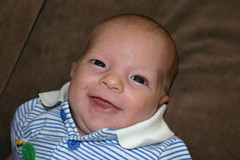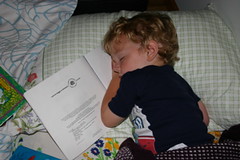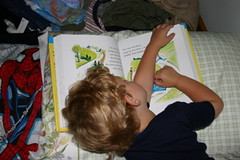We are off on our first trip as a family of four tomorrow. It's the Poconos for us. When I tell people this, if they are from the East Coast they give me a knowing look, but because I'm not from the east I don't quite know what they are referring to--I don't know what kind of cultural meaning "The Poconos" carries. New York honeymooners? Cheesy family theme parks? The Delaware Water Gap? Dunno. We'll see tomorrow what it's like, after a stop in Hershey. That, I do know what it means.
In preparation for the term I read two of the books that I am going to assign but that I haven't read before. Virginia Woolf's JACOB'S ROOM, a short one, only her second novel I think, was the first one I tackled. It feels like an experiment in form rather than a full-fleshed novel, although the extensive notes in the
Penguin Twentieth-Century Classics edition make the argument that the book was really about Thoby Stephen, Woolf's brother who died of typhoid in 1906. Jacob certainly bears a resemblance to him, but I found that less interesting that Woolf's use of a kind of snapshot version of narrative--little pieces, from various points of view, that add up to an almost-comprehensive version of a life.
Fitzgerald's THE BEAUTIFUL AND DAMNED, on the other hand, is a second novel with an almost vehement drive and sense of irony. Generally understood as Fitzgerald's fictionalization of his contentious and sodden marriage to Zelda, the book tells of a privileged Ivy Leaguer whose main struggle is to keep from having to work. He marries a beautiful Kansas City debutante, and the two of them drink their way through several years of marriage (including the protagonist's year stationed Stateside during World War I). Like BLEAK HOUSE, which I just finished, the plot centers on a contested will; Anthony Patch, the main character, is disputing his plutocratic Prohibitionist grandfather's disinheritance of him (resultant from gramps stumbling in on a drunken party). Although it was a quick and enjoyable read, it felt as if it would have made a better shorter book--like GATSBY, which really moves along. I've gained new respect for Fitzgerald as a stylist, though.





